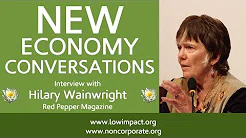With Hilary Wainwright of Red Pepper Magazine and and a fellow of the Transnational Institute (TNI).
Highlights:
- Ultimately all value comes from human creativity, and that value is extracted, appropriated and privatised. But the value is inherently social. It’s the product of social collaboration, so an alternative has got to start from that level – inside the production process rather than from the state. It’s about people’s tacit, practical knowledge, that’s not necessarily explicit.
- There’s nothing per se wrong with a market, which is just a means of exchange. But you have to take into consideration the social context in which a market is embedded, and a capitalist market isn’t ‘free’.
- Corporations only have power because they have a monopoly on material production. If co-ops and mutual organisations were producing food and the other necessities of life, then corporations wouldn’t have that power. So we have to create that material base for a different kind of state. So when an alternative government is elected, it’s not just up against the corporate sector, it’s resting on an emerging alternative.
Links:
Mondragon
Fernand Braudel
Studies in Mutualist Political Economy
Transcript on LowImpact.org.
